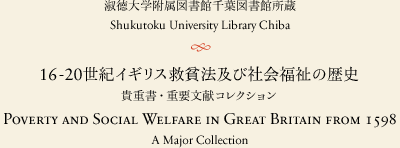 |
 |
 |
 |
1818
HOSPITAL FOR THE POOR AND REPORT ON
THE MANAGEMENT OF THE POOR IN GLASGOW |
103. [CHALMERS, Thomas et. al]. Report for the directors of the town's hospital
of Glasgow on the management of the City Poor, the suppression of Mendicity, and
the principles of the plan for the New Hospital. Glasgow: R. Chapman. 1818.
Original boards, uncut. A nice copy in the original condition.
An important and substantial document to which Thomas Chalmers made considerable
contributions. Sections included "Management of the City Poor", "Suppression of
Mendicity", "Principles of Hospital" , "Observations on Poor Rates". The Town
Hospital was the institution through which public indoor and outdoor relief was
administered.
Thomas Chalmers (1780-1847}, Scottish philanthropist. Sir Charles Loch in Charity
and the Social Life speaks, perhaps somewhat extravagantly of Chalmers's ideas as
the first original contribution to the theory of charity since Aristotle and St. Paul. He
was certainly one of the most important and influential of Scottish philanthropists in
the nineteenth century. His earliest experiences of Poor Relief led him to compare the
difference between relief from public funds and provision which relied entirely on
charity. His first parish in Roxburghshire made provision for a Poor Rate, his second
Kilmay relied upon charity.
"I spent some months in a parish in Roxburghshire, before I came to Kilmay. The
poor rate had been introduced from England; and I saw as much poverty and more
depravity of character than I hope I shall ever witness in these northern climes. The
same population were supported at about six times a greater rate than they are in this
neighbourhood (Kilmay). Mr. Malthus' theory upon this subject would have carried
me even without examples."
Chalmers's social philosophy was based upon an intractable opposition to the system
of statutory poor relief as practised in England. He was in complete agreement with
Malthus in deploring the demoralising and pauperising effect (as he saw it) of legal
entitlement. Instead he emphasised a reliance on Charity and self-help. For several
years he conducted, with considerable success, an experiment in the management of
the Poor on these lines in his Glasgow parish. Eventually this experiment, like many
others, which depend so much on the work an inspiration of one individual, failed.
Chalmers, according to Karl de Schweinitz in England's road to social security,1943,
by concentrating almost entirely on the personal factors in destitution wholly
overlooked the social-economic causes of distress. Chalmers real achievement was to
bring methodology to the administration of relief. Fifty years later the London Charity
Organization Society built its programme largely upon his theories and procedure. The
movement thus started spread, throughout the English-speaking world, the concept of
method which he had created. Ironically it came to inform the kind of relief Chalmers
had most opposed, relief by government agencies.
|
 |
|
 |
 |
 |
 |
|



